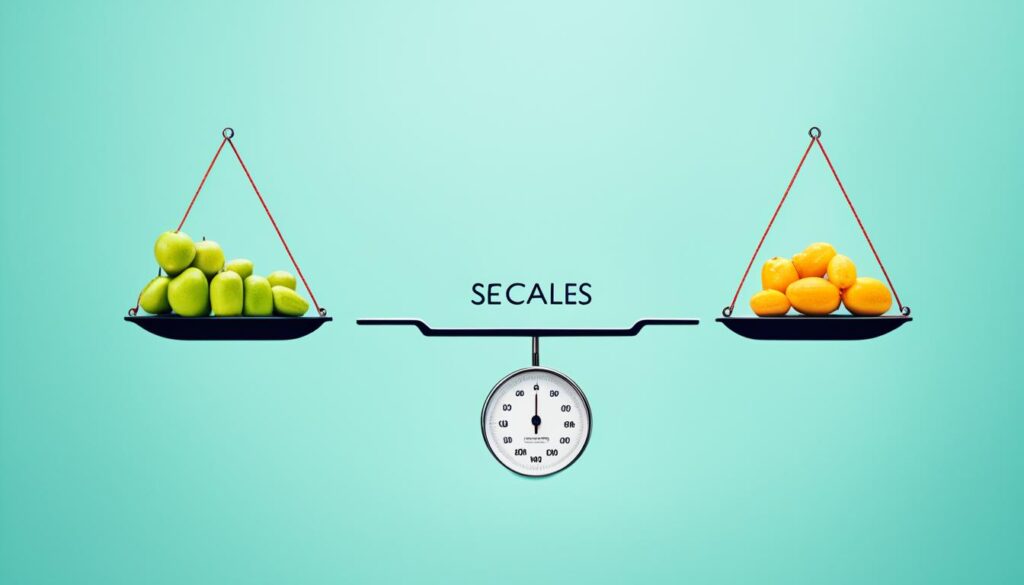Do you often find yourself overwhelmed by an ever-growing to-do list? Are you struggling to find the time to focus on what truly matters? Effective time management is the key to unlocking your productivity potential and achieving your goals.
In today’s fast-paced world, mastering the art of time management is more important than ever. It can lead to reduced stress, increased productivity, and greater achievements in all areas of your life. By implementing a few simple techniques and strategies, you can take control of your time and make the most out of every day.
Key Takeaways:
- Prioritizing tasks and activities is crucial for effective time management.
- Planning ahead and conducting a weekly review can help structure your time effectively.
- Focusing on a single task, learning to say no, and blocking out distractions can improve your time management skills.
- Delegate tasks whenever possible to free up your time for more important activities.
- Remember to take breaks and get enough rest to maintain productivity and avoid burnout.
The Importance of Mastering Time Management Skills
Time management skills are crucial for increasing productivity and efficiency. They play a significant role in reducing stress and anxiety by helping individuals prioritize tasks and create a sense of balance in their lives. Effective time management allows people to work smarter, not harder, enabling them to make better choices about how they utilize their time.
Good time management is the key to maintaining a healthy work-life balance, ensuring personal and professional success. By managing their time effectively, individuals can allocate the necessary resources to both their work and personal lives, resulting in greater overall satisfaction.
However, many people face challenges when it comes to time management. Procrastination, distractions, poor prioritization, and ineffective planning are common obstacles that hinder efficient use of time. Fortunately, there are strategies that can help overcome these challenges.
- Break tasks into smaller steps: By breaking larger tasks into manageable chunks, it becomes easier to tackle them one at a time.
- Set deadlines: Establishing clear deadlines for tasks creates a sense of urgency and helps individuals stay focused and motivated.
By implementing these strategies and developing effective time management skills, individuals can overcome common challenges and maximize their productivity.
| Benefits of Mastering Time Management Skills | Common Challenges in Time Management | Effective Strategies |
|---|---|---|
| Increased productivity | Procrastination | Break tasks into smaller steps |
| Reduced stress and anxiety | Distractions | Set deadlines |
| Improved work-life balance | Poor prioritization | |
| Ineffective planning |
Proven Time Management Strategies for Increased Productivity
When it comes to effectively managing your time and boosting productivity, implementing proven strategies can make a significant difference. By incorporating these time management strategies into your daily routine, you can accomplish more while minimizing stress and distractions.
The Pomodoro Technique

One popular strategy is the Pomodoro Technique, named after the tomato-shaped timer used by its creator, Francesco Cirillo. This technique involves breaking your work into intervals, typically 25 minutes long, known as “Pomodoros.” After each Pomodoro, take a short break of 5 minutes. After completing several Pomodoros, take a longer break of 15-30 minutes. This method helps improve focus, maintain energy levels, and prevent burnout.
Time Blocking
Another effective strategy is time blocking, where you allocate specific time blocks for different tasks or activities. By dedicating uninterrupted time to each task, you can concentrate fully and avoid distractions. This strategy helps you overcome multitasking and enhances your ability to prioritize important work.
The 80/20 Rule (Pareto Principle)
The 80/20 rule, also known as the Pareto Principle, suggests that 80% of your results come from 20% of your efforts. By identifying and focusing on the most crucial tasks or activities that yield the greatest outcomes, you can optimize your productivity. This rule allows you to prioritize your time and resources efficiently.
The Eisenhower Matrix
The Eisenhower Matrix, named after former US President Dwight D. Eisenhower, provides a framework for categorizing tasks based on their urgency and importance. This strategy involves dividing tasks into four quadrants: Urgent and Important, Important but Not Urgent, Urgent but Not Important, and Not Urgent or Important. By categorizing and prioritizing tasks, you can allocate your time effectively and avoid spending it on low-impact activities.
Implementing these time management strategies can greatly enhance your productivity and allow you to make the most of your time. Choose the strategies that resonate with your work style and objectives, and experiment with different combinations to find what works best for you.
Time Management Tips for Different Aspects of Life
Effective time management is essential for maintaining a healthy work-life balance and achieving success in both personal and professional realms. By implementing practical strategies and following these time management tips, you can optimize your productivity and make the most of your time.
1. Set Clear Goals and Objectives
Start by setting clear goals and objectives for each aspect of your life. Whether it’s work-related tasks, household chores, or personal goals, having a clear direction will help you prioritize and stay focused.
2. Prioritize Tasks
Identify the most important tasks that need your immediate attention. Prioritizing your to-do list will allow you to allocate your time and energy efficiently, ensuring that critical tasks are completed first.
3. Break Larger Tasks into Smaller Steps
When faced with large or complex tasks, break them down into smaller, more manageable steps. This approach helps prevent overwhelm and allows you to make progress steadily.
4. Establish Routines
Establishing routines can help you create structure and maintain consistency in your daily life. Whether it’s a morning routine to kickstart your day or an evening routine to wind down, routines can provide a sense of stability and increase your efficiency.
5. Delegate Tasks
Don’t be afraid to delegate tasks that can be handled by others. Whether it’s at work or at home, delegating tasks not only frees up your time but also allows others to contribute and grow.
6. Create a Schedule and Set Boundaries
At home, create a schedule that includes dedicated time for family, relaxation, and personal activities. Setting boundaries with family members and loved ones is crucial to ensure uninterrupted focus during work or personal time.
7. Practice Self-Care and Set Realistic Goals
Taking care of yourself is essential to maintain overall well-being and effectiveness. Incorporate self-care activities into your routine and set realistic goals that align with your priorities and values.
Remember, effective time management is about finding the right balance that works for you and allows you to thrive in all aspects of your life.
| Aspect | Time Management Tips |
|---|---|
| Work | Delegate tasks, maintain a consistent routine, and prioritize important assignments. |
| Home | Create a schedule, set boundaries with family members, and break down household chores. |
| Personal Life | Practice self-care, set realistic goals, and establish routines for personal growth and relaxation. |

The Role of Technology in Time Management: Tools and Apps
Technology has revolutionized the way we approach time management. With the right tools and apps, we can track our time, manage tasks efficiently, and boost our productivity like never before.
Calendar and scheduling apps are invaluable for organizing our days, weeks, and months. They allow us to create events, set reminders, and sync our schedules across multiple devices. Whether it’s a crucial meeting or a personal deadline, these apps help us stay on top of our commitments.
Task management apps are another essential tool in our time management arsenal. They enable us to break down complex projects into manageable tasks, set priorities, and track progress. By visualizing our to-do lists and getting reminders, we can ensure that no task slips through the cracks.
Time tracking apps provide valuable insights into where our time goes. With these apps, we can monitor how much time we spend on different activities, identify time-wasting habits, and make adjustments accordingly. By understanding our time usage patterns, we can optimize our schedules for maximum efficiency.
In the age of constant distractions, focus and productivity apps come to the rescue. These apps help us block out distractions like social media notifications and prioritize deep work. They use techniques like the Pomodoro Technique or ambient noise to create a productive environment that maximizes our concentration and output.
Finally, habit-building apps are powerful tools for establishing positive routines. They assist us in developing and maintaining healthy habits, such as regular exercise, meditation, or goal setting. By integrating these habits into our daily lives, we can improve our time management skills and overall well-being.
Overall, technology offers a wide array of time management tools and apps that can enhance our productivity and effectiveness. Let’s embrace these technological advancements to take control of our time and achieve our goals.
The Benefits of Technology in Time Management
Technology has revolutionized time management, offering a range of benefits:
- Efficient organization and scheduling
- Streamlined task management
- Insightful time tracking and analysis
- Enhanced focus and productivity
- Established positive habits
With these advantages at our fingertips, leveraging technology is essential in our quest for optimal time management.
Conclusion
Effective time management is the key to productivity and achieving goals. By implementing various strategies and tips, individuals can improve their time management skills and make the most out of each day. Prioritizing tasks, setting clear goals, and creating a schedule are essential aspects of effective time management. It allows individuals to stay focused and accomplish more in less time.
Furthermore, finding a balance between work and personal life is vital for overall well-being. By managing time efficiently, individuals can carve out quality time for loved ones and pursue activities outside of work. This creates a healthy work-life balance and prevents burnout.
In today’s digital age, technology can be a valuable tool in time management. Utilizing time tracking apps, task management software, and other productivity tools can help individuals stay organized and make better use of their time. Developing consistent habits and routines also contribute to successful time management, allowing individuals to streamline their daily activities and achieve their goals with ease.
















